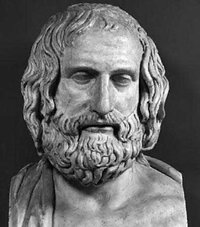Euripides
|
|
Euripides (c. 480 BC–406 BC) was one of the three great tragedians of classical Athens, along with Aeschylus and Sophocles; he was the youngest of the three and was born c. 480 BC. His mother's name was Cleito, and his father's either Mnesarchus or Mnesarchides. Evidence suggests that Euripides' family was comfortable financially. He had a wife named Melito, and together they had three sons. It is rumored that he also had a daughter, but she was killed after a rabid dog attacked her. Some call this rumor a joke that Aristophanes, a comic writer who often poked fun at Euripides, wrote about him. However, many historians fail to see the humor in this and believe it is indeed true.
According to ancient sources, he wrote over 90 plays, 18 of which are extant (since it is now widely agreed that the play Rhesus was actually written by someone else). Fragments of most of the other plays survive, some of them substantial. The number of Euripides' plays that have survived is more than that of Aeschylus and Sophocles together, partly due to the chance preservation of a manuscript that was likely part of a complete collection of his works.
The record of Euripides' public life, other than his involvement in dramatic competitions, is almost non-existent. There is no reason or historical evidence to believe that he travelled to Syracuse, Sicily or engaged himself in any other public or political activities during his lifetime, or left Athens at the invitation of Archelaus II and stayed with him in Macedonia after 408 BC.
Euripides first competed in the famous Athenian dramatic festival (the Dionysia) in 455, one year after the death of Aeschylus. He came in third. It was not until 441 that he won first place, and over the course of his lifetime, Euripides claimed a mere four victories.
From his plays it is apparent that he was very skeptical of Greek religion, and was aware of intellectual movements of his time, such as the Sophists. He reshaped the formal structure of traditional Attic tragedy by showing strong women characters and smart slaves, and by satirizing many heroes of Greek myths.
Euripides was a frequent target of Aristophanes' humor. He appears as a character in The Acharnians, Thesmophoriazousae, and most memorably in The Frogs, where Dionysus travels to Hades to bring Euripides back from the dead. After a competition of poetry, Dionysus opts to bring Aeschylus instead.
Euripides' final competition in Athens was in 408. Although there is a story that he left Athens embittered because of his defeats, there is no real evidence to support it. He died in 406, probably in Athens or nearby, and not in Macedon, as some biographers repeatedly state.
When compared with Aeschylus, who won thirteen times, and Sophocles, with eighteen victories, Euripides was the least honored, though not necessarily the least popular, of the three — at least in his lifetime. Later, in the 4th century BC, the dramas of Euripides became more popular than those of Aeschylus and Sophocles. His works influenced New Comedy and Roman drama, and were later idolized by the French classicists; his influence on drama reaches modern times.
Euripides' greatest works are considered to be Alcestis, Medea, Electra and The Bacchae.
In April 2005, classicists at Oxford University, employing infrared technology previously used for satellite imaging, unearthed previously unknown material by Euripides. [1] (http://news.independent.co.uk/world/science_technology/story.jsp?story=630165)
| Contents |
Works
Tragedies of Euripides
- Alcestis (438 BC, second prize)
- Medea (431 BC, third prize)
- Children of Heracles (c. 430 BC)
- Hippolytus (428 BC, first prize)
- Andromache (c. 425 BC)
- Hecuba (c. 424 BC)
- Suppliant Women (c. 423 BC)
- Electra (c. 420 BC)
- Heracles (c. 416 BC)
- Trojan Women (415 BC, second prize)
- Iphigeneia in Tauris (c. 414 BC)
- Ion (c. 413 BC)
- Helen (412 BC)
- Phoenician Women (c. 410 BC, second prize)
- Orestes (408 BC)
- Bacchae and Iphigeneia at Aulis (405 BC, posthumous, first prize)
Satyr play
- Cyclops (unknown)
Spurious play
- Rhesus (mid of 4th Century BC, probably not by Euripides, as sustained today by most scholars)
References
- Croally, N.T. Euripidean Polemic: The Trojan Women and the Function of Tragedy. Cambridge University Press, 1994.
- Ippolito, P. La vita di Euripide. Nápoles: Dipartimento di Filologia Classica dell'Universit'a degli Studi di Napoli Federico II, 1999.
- Kovacs, D. Euripidea. Leiden: Brill, 1994.
- Lefkowitz, M.R. The Lives of the Greek Poets. London: Duckworth, 1981.
- Scullion, S. Euripides and Macedon, or the silence of the Frogs. The Classical Quarterly, Oxford, v. 53, n. 2, p. 389-400, 2003.
- Webster, T.B.L., The Tragedies of Euripides, Methuen, 1967.
See Also
External links
- http://perseus.uchicago.edu/cgi-bin/text?lookup=encyclopedia+Euripides
- http://www.theatrehistory.com/ancient/euripides001.html
- http://www.fordham.edu/halsall/ancient/eb11-euripides.html
- http://www.ac-strasbourg.fr/pedago/lettres/Victor%20Hugo/Notes/Euripide.htm
- http://www.perseus.tufts.edu/~amahoney/tragedy_dates.html
- Works by Euripides (http://www.gutenberg.org/author/Euripides) from Project Gutenbergde:Euripides
el:Ευριπίδης fr:Euripide ko:에우리피데스 it:Euripide he:אוריפידס nl:Euripides ja:エウリピデス pl:Eurypides pt:Eurípedes sv:Euripides uk:Евріпід zh:欧里庇得斯 sr:Еурипид

